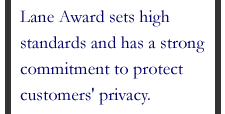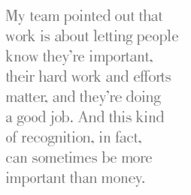My Smartest Mistake
Gary Kusin
CEO, FedExKinko’s
 A 360-Degree Spin
A 360-Degree Spin
Kinko’s CEO Gary Kusin thought he was doing a good job in all phases of running the company. Then he learned that some of his people skills shouldn’t be copied. Here’s what he did about it.
![]() LEARNED ABOUT GIVING REWARDS AND recognition the hard way. I’m known for being an inspirational leader with front-line workers: throughout my business career, I always got feedback that they like how I speak about the company’s vision and what we need to do to realize it. So when we decided to adopt 360-degree feedback at Kinko’s three years ago, I was confident I would fly through it. I thought, what a great opportunity to learn about myself and my management team. It was – but what I learned was that all along I had been making a big mistake.
LEARNED ABOUT GIVING REWARDS AND recognition the hard way. I’m known for being an inspirational leader with front-line workers: throughout my business career, I always got feedback that they like how I speak about the company’s vision and what we need to do to realize it. So when we decided to adopt 360-degree feedback at Kinko’s three years ago, I was confident I would fly through it. I thought, what a great opportunity to learn about myself and my management team. It was – but what I learned was that all along I had been making a big mistake.
We adopted 360-degree feedback about a year after I came to Kinko’s (this was before Kinko’s partnered with FedEx). It was my first experience with having my performance reviewed by the people who reported to me. I had founded most of the places I had worked at previously and things had run smoothly enough that I didn’t see much use for 360-degree feedback. But Kinko’s had been in turmoil before I came in. I had a new senior management team and I was very curious about how we were gelling as a team, particularly among my nine direct reports.
I’ve always believed that you should hire the best people you can possibly find and then get the hell out of their way. My job is to lower barriers that prevent them from doing their job. I always had high expectations from my senior team, and they seldom disappointed me. I call that effective management. But when I got the results of their feedback, much to my surprise, I found out that wasn’t enough.
I can’t remember the number of categories I was graded on but I was getting a bunch of 99s and 98s – and then there was this one category where I got a 30. It stuck out like a sore thumb and it was in the area of rewards and recognition.
 Frankly, at first I thought it had to be an error. But I knew it wasn’t when the person who led the process got a little smirk on his face as I challenged the score. I could tell I was in for a rude awakening.
Frankly, at first I thought it had to be an error. But I knew it wasn’t when the person who led the process got a little smirk on his face as I challenged the score. I could tell I was in for a rude awakening.
To put it in perspective, he explained that I should feel good about my high scores: they had about 50,000 CEOs in their database and those scores meant I was really good. But equally true was the fact that comparing my low score to about 50,000 CEOs meant I really sucked.
I know that as a CEO, I’m not getting honest feedback a lot of the time but I took those results as dead-on honest feedback. Also, I’ve got an ego, and that low score was good motivation to change. If I were going to be an effective manager, a response was required.
At our next weekly staff meeting, I told my entire senior team about the feedback results. I said, “Boy, was I surprised.” I could tell by the looks on their face that they weren’t.
They all expressed to me later that they all liked me and respected me, and they liked the way I treated them with respect. But they also pointed out that that’s not all that work is about. Work is about letting people know that they’re important, that their hard work and efforts matter, and that they’re doing a good job. And that recognition, in fact, is more important than money.
They agreed that I’m good at that out in the company. “Starting at the level below us, you’re awesome,” they said. “You walk around and give people high fives. But you never do that with us.”
It had not occurred to me that people really wanted that or needed that because I don’t really feel I want it or need it. That’s just the way I am. I was treating them the way with I was fine with being treated. But as I reflected on it, I realized it was wrong.
I learned the power of recognition 60 days later. It was just before Christmas. I got nine pieces of crystal and had each one engraved with something special about each one of my team. At the end of our weekly staff meeting, I stood up and said, “I have some rewards I want to give out.” Everyone started laughing because they figured that now Gary’s on a reward and recognition kick.
One at a time, I spotlighted each person and started talking to the group about him or her. These were seasoned professionals, high-level corporate executives. First they would blush, then they sat up proudly, and everyone else sat up proudly, too, because we had done an extraordinary job and we all knew it. We just hadn’t talked about it. It was a very emotional time for everyone in the room.
I got such a good warm feeling that I realized I had a gaping hole in the most important part of my management repertoire and that was the ability to say, “Thank you, great job, I appreciate you and what you’re doing for the company.” It was obvious that this is the most important thing a leader can do.
Because I didn’t have that page in my playbook, I asked the group, “Would you please help me be better? If you think I’m missing an opportunity, I want to know about it. If you think someone is doing a good job, I want to everyone to know about it.” I think there was a little fear and trepidation of how I would deal with this, but when people saw that I legitimately cared, I got a lot of help.
For example, the head of our sales organization would give me a piece of paper and say, “These are people across the sales organization, this is what they’ve done that’s so extraordinary, and if they heard from you, they’d fall out of their chairs.” I now do that every month. It’s becoming a big part of the culture in this company.
My assistant reminds me to put recognition on my calendar. I put it on my own agenda for these regular staff meetings with senior management. And for the past three years, I’ve picked an MVP on the management team and given him or her special recognition.
 In addition to showing appreciation for my reports’ hard work, I’ve also learned to recognize that of my peers and my boss. I know it sounds like sucking up. But people know that I don’t say something unless I mean it.
In addition to showing appreciation for my reports’ hard work, I’ve also learned to recognize that of my peers and my boss. I know it sounds like sucking up. But people know that I don’t say something unless I mean it.
Fred Smith is my boss, he is the head of FedEx. It’s getting increasingly easy to say to him, “Great insight” or “You came at that completely differently and I just learned something.” I’m one of eight people on the strategic management committee of the corporation, and when my colleagues do something that’s really good, I’m getting increasingly comfortable saying, “That was really good.” You know what? They like it. And I have to admit that even though I didn’t think I needed it, when I get feedback from them that’s positive, I like it, too.
The things I’m doing now, all my direct reports are doing and their direct reports are doing. You can feel it rolling out in the company. As you walk through the building now, you see photos of people who have done good things, neat stuff that is personalizing this organization.
We’re letting ideas for reward and recognition bubble up. For example, this year, for the first time we went to summer hours. People get out at one o’clock on Fridays. Some might say that’s a personnel policy but that thought comes from the same place where a “thank you” comes from. Similarly, we took everyone here at headquarters and a guest out to a baseball game. We came up with the idea at a town hall meeting, when someone suggested we take a seventh-inning stretch. These are the kinds of things that make people believe, “This is a company that appreciates me, where I’m recognized and I have some worth other than putting in the hours.” You can say it’s altruistic but, frankly, giving people opportunities to grow and helping them grow is good business. If people are happy and believe in the company they’re working for, you get better results. We’re already way better than we have been, but we’re not as good as we’re going to be.
When you first start this, everyone’s going to be from Missouri: They have to see it to believe it and they have to see it repeatedly before they believe you’re sincere about it. You have to be both persistent and consistent. I think my team now believes it, and my company will believe it over time. You build up a level of trust over the organization.
Trust is an unbelievably strong resource to have in a company. Every organization at some point in its life will hit a rough patch. When that happens, whether it’s belt-tightening or a reverse of direction, you’d like to have that foundation of trust to fall back on. Recognition is one of the things that builds trust over time. And I’d be way behind in this area had I not been slapped on that 360.




